Thanks for your support! If you make a purchase using our links in this article, we may make a commission. And, as an Amazon Associate, I earn from qualifying purchases. See the full disclosure here.
Updated April 5, 2024
Now that you have your travel trailer, you should know what size generator your travel trailer needs. One of the first things we purchased for our travel trailer was the generator since we won’t always be parked in an RV campground.
We found out on our very first trip that our generator didn’t even have enough power to run the coffee maker. We’re here to help make sure that you have the right generator for your needs!
- Do Travel Trailers Come With Generators?
- Do Motorhomes Come With Generators?
- What Size Generator for Travel Trailer?
- How Much Power Do I Need for My Travel Trailer?
- How Many Watts Does My Travel Trailer Generator Need?
- 4 FAQs About What Size Generator You Need for A Travel Trailer?
- 8 FAQs: What Generator Works for My Travel Trailer Size?
- 1. What Size Generator for a 25-foot Travel Trailer?
- 2. What Size Generator for a 30-foot Travel Trailer?
- 3. What Size Generator for a 40-foot Travel Trailer?
- 4. What Size Generator for a 30amp Camper?
- 5. What Size Generator for a 50amp Camper?
- 6. What Size Generator for a 5th Wheel?
- 7. Do I Need a Generator in My Small Camper?
- 8. Do I Need a Generator in My Toy Hauler?
- How Much Power Do I Need? | How Many Watts Do I Need?
- How Much Are RV Generators?
- What Generator Fuel is Best – Gas or Propane?
- How Much Fuel Does A Portable Generator Use?
- What to Consider When Buying a Generator for a Travel Trailer
- What are the Best Brands of Portable Generators? Our Top 5 Picks
- 3 FAQs About Generators For Your Travel Trailer
- How Often Should You Service A Generator?
- What Size Generator Will You Buy for Your Travel Trailer?
- Related Reading:
- Mike Scarpignato – Bio
Do Travel Trailers Come With Generators?
Not usually. If it does, it’s generally an option. Toy haulers, which certainly come in travel trailer configurations, are more likely to come equipped with an onboard generator. Of course, you can always purchase a generator separately, add solar panels, or even a portable wind turbine.
It’s all a matter of what your energy needs are and what you plan on doing with the travel trailer. There are some notable exceptions, such as the Forest River Sunseeker 3050S, the Wolf Creek 850, the Northwoods Arctic Fox 22G, and the Forest River XLR Boost, just to name a few.
If you step foot in an RV dealership, your odds of finding a travel trailer with a generator are slim and none, but that doesn’t mean a little hard work and research won’t strike gold.
Do Motorhomes Come With Generators?
For the most part, Class A and Class C motorhomes come with generators. However, some older models may not. Class B RVs are a little more hit-and-miss. At the very least, there will be a compartment or space for you to add a portable generator.
Most generators that come with motorhomes run off the same fuel as the motorhome, for purposes of convenience. RVers don’t want to purchase both gas and diesel when they stop and refuel. Also, these built-in generators run off the same fuel tank, which helps save space with a generator that lacks its own fuel tank.
Unfortunately, this also means that maintenance is more difficult on built-in generators. If you have to purchase a portable generator to add to your rig, you’re better off in terms of maintenance.
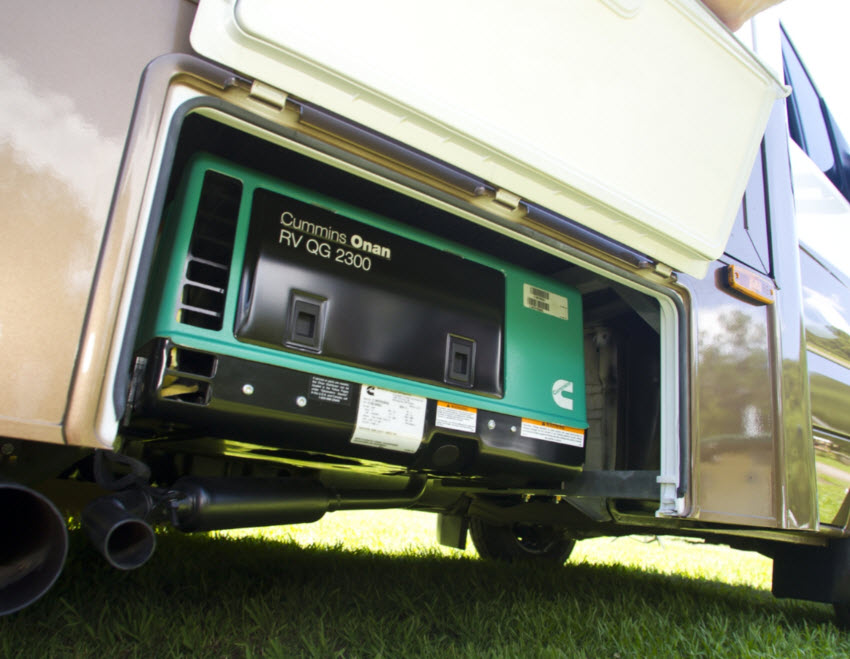
What Size Generator for Travel Trailer?
The best size generator for your travel trailer should have 3000W to 40000W. It should have enough wattage to run your AC unit, which is usually around 2000-3000W; add an additional 600 to 1000 watts to that number, and you have a 3000-4000W total needed for your travel trailer generator.
How Much Power Do I Need for My Travel Trailer?
You have the travel trailer, and you’re shopping for a portable generator to power your air conditioner, furnace, and big and small kitchen appliances. The obvious question is: How big of a generator do I need for my travel trailer?
Usually, that question is determined by another: How big of a generator do I need to run my travel trailer’s air conditioner?
Your air conditioner will be taking the most wattage by far, so you need to start here. You also need to know that it takes more power to start the air conditioner than it does to keep it running. Keep reading to learn more about how many watts you’ll need to run your air conditioner and other appliances.
How Many Watts Does My Travel Trailer Generator Need?
The minimum wattage of the generator you need is equal to the starting wattage of your air conditioner.
Do you need to run a space heater (1500 watts), maybe keep your beverages cold in the fridge (600 watts), and listen to the radio (50 to 200 watts) while sitting around the table? That’s around 2000-2300 watts in total.
Maybe all you need is your coffee in the morning, so you’ll need 600 watts for that. To use your laptop (250 watts), charge your smartphone (4 watts), and lightbulbs (5 to 60 watts), you’ll need at least 300 watts. There’s a lot to consider so that you purchase the right generator and you don’t have the same problems we did.
At this point, you also need to know that most generators have a starting watts and running watts rating. So a 3000W generator might give you up to 3000W to start that air conditioner, but for long-term use, it might only be rated at 2600W.
So let’s say your 3000W generator starts up your 13,500 BTU air conditioner, which might run at 2000W. Now, you have around 600W to use on other items long-term. This might be enough to watch TV with your satellite receiver or start your slow cooker while listening to the radio.
Ultimately, you need to be mindful of your trailer and how much power is required to run certain things.
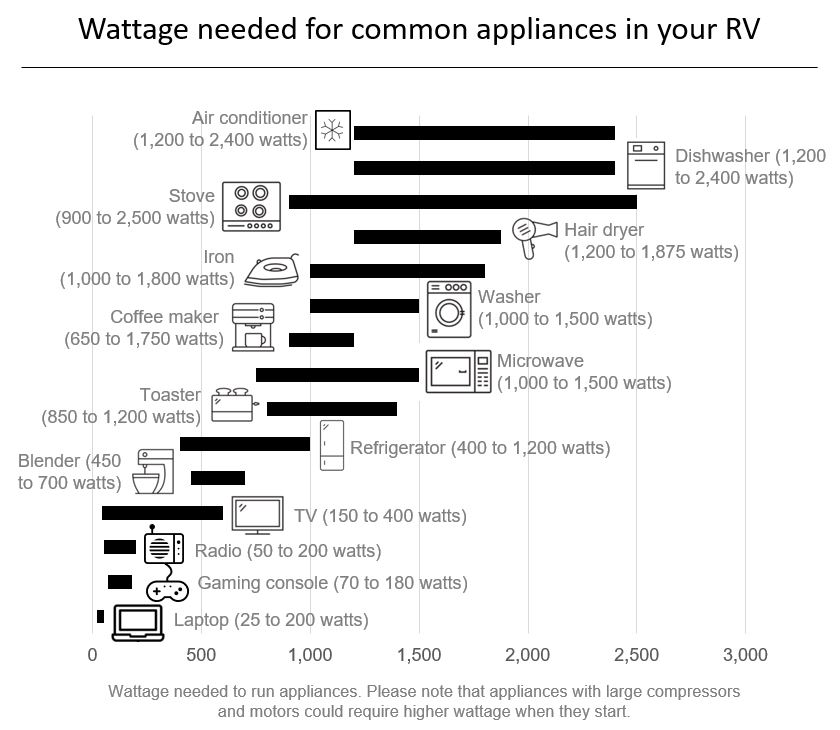
4 FAQs About What Size Generator You Need for A Travel Trailer?
A lot of people ask exactly how many watts they might need for their travel trailer. We wanted to tackle a few specific FAQs on this subject to help you decide if the generator you’re considering will work for your travel trailer.
1. Will a 2000 Watt Generator Work for My Travel Trailer?
If you have a small travel trailer, a 2000-watt generator will likely be sufficient. It can even run a small air conditioning unit provided that the starting watts and running watts of the AC unit don’t exceed 2000 watts.
Take stock of the wattage you use daily in your RV to determine if 2,000 watts is adequate. Remember that you might not run everything requiring a generator simultaneously. So if you plan to run only your 11,000 BTU AC unit and nothing else, 2,000 watts will likely be enough. However, you won’t be able to run this size AC unit and a refrigerator simultaneously.
If you’re not running your AC unit, you can power a lot more on 2,000 watts, including your refrigerator, flat-screen TV, and your laptop charger.
2. Will a 3000 Watt Generator Work for My Travel Trailer?
A 3000-watt generator will be sufficient for a small RV with basic appliances and few personal devices. Check the wattage requirements on your major appliances like your refrigerator, heater, and air conditioner before purchasing a generator of this size.
As always, consider an ideal day in your travel trailer. Will you want to watch TV while keeping food cold and sitting under the air conditioning vent? Maybe you want to do some work on your laptop or listen to the radio simultaneously. Do the math and see if you can operate with a 3000-watt generator. Chances are it’s doable, but it will be a little tight.
3. Will a 5000 Watt Generator Work for My Travel Trailer?
For most travel trailers, a 5,000-watt generator will be more than enough. It’s often the preferred wattage generator for larger RVs with more energy requirements. It should be able to run your air conditioner, refrigerator, lights, TV, laptop charger, and more with a small amount left over. But it might be too much for your small RV.
However, there are some pretty massive travel trailers on the market with all the bells and whistles. If your camper is decked out in the latest and greatest comforts, you might need a larger generator to cover your power needs. Again, it comes down to doing the math.
Additionally, you don’t want to overdo it with your generator. There’s simply no need to lug around a massive, heavy generator that has more power than you need. You’ll be paying more for the larger unit and for the fuel to operate it, and you don’t want that.
4. Will a 3500W Generator Run a 15,000 BTU AC?
It’s not uncommon to find a 15,000 BTU AC unit in larger travel trailers, and 3,500W might not be enough. Typically, an AC unit of this size takes about 1,500 running watts, but it requires far more to start up. You’ll need 3,000-3,500 watts to start your 15,000 BTU AC unit.
So, in theory, a 3500W generator would be enough to start and then run your AC unit. But you’d have to ensure that absolutely no other devices are drawing power. Everything would have to be unplugged, so you don’t overload your generator.
It’s better to play it safe and seek out a 5,000W generator to ensure your power needs are met with such a large AC unit.
8 FAQs: What Generator Works for My Travel Trailer Size?
Here’s another common FAQ we often get: What generator will work for my travel trailer size? Again, we wanted to offer some specific answers to specific questions to ensure your travel trailer will have adequate power coverage.
1. What Size Generator for a 25-foot Travel Trailer?
The length of your travel trailer doesn’t necessarily dictate your RV’s power needs. That said, typically, a smaller travel trailer requires less power, so you could probably get away with a generator between 2,500W and 4000W. If your trailer has no AC, you could use a generator that’s 2,000W or less.
When towing a 25-foot camper, weight is always a factor. You can only bring along so much, so you want to avoid bringing along a portable generator that’s bigger and heavier than you need. Add up your electricity needs and make an informed decision from there.
2. What Size Generator for a 30-foot Travel Trailer?
A few extra feet of travel trailer likely means a few extra power needs. You’ll want your portable generator to meet those needs, and a 3,000-4,000-watt generator should do the trick.
If you’re traveling without an AC unit or it’s a low-BTU unit, a 3,000-watt generator might work for you. However, most 30-foot trailers are equipped with appliances, an air conditioning unit or two, electronic devices, small kitchen appliances, and other creature comforts, you might be happier with a 5,000-watt generator.
3. What Size Generator for a 40-foot Travel Trailer?
If your travel trailer is 40 feet or over, chances are, you’ll need at least a 5,000-watt generator. Most huge travel trailers like this have more than one generator. Many huge fifth wheels and travel trailers use up to 12,000W in generator power.
In some situations, more power really is better. Some of the largest travel trailers are more like homes than they are campers, and you don’t want to be without your home comforts in such a luxury rig.
Still, don’t go too overboard. Do your math, and make sure you’ve got enough power to cover your needs.
4. What Size Generator for a 30amp Camper?
You’ll need 3,000-3,500 watts minimum to run a 30-amp camper. Typically, a 30-amp electrical outlet will supply 3,600 watts, so matching that wattage in your portable generator just makes sense.
This will be enough energy to run a standard AC that’s 13,500 BTU or less plus a few lights. However, if you want to run your AC and kitchen appliances, you’ll likely need a larger generator.
5. What Size Generator for a 50amp Camper?
Most RVers with a 50amp camper prefer a generator between 5,000 and 12,000 watts. Depending on your power needs, you can get away with a 3,500W generator IF you have a low-BTU AC unit or no AC unit. However, a 3,000-4,000W generator can only supply a load of 30 amps, so you won’t be able to run everything.
It’s not uncommon to see 12,000-watt generators on 50amp campers, which supply plenty of electricity for multiple AC units, your refrigerator, lights, media centers, and more.
6. What Size Generator for a 5th Wheel?
Your unique power needs will determine your generator size, but if you have an AC unit, you’ll need 3,500 watts minimum. The average generator size for a fifth wheel is between 5,000 and 12,000 watts. A 5th wheel with all the trimmings will likely require 9,000-12,000 watts to supply adequate power for your daily needs.
7. Do I Need a Generator in My Small Camper?
Nope! A generator is optional, but it is nice to have. Usually, you’ll use a generator when you’re boondocking or camping somewhere without hookups. It runs your AC unit, refrigerator, and other electrical devices. But if you’re okay with rustic camping with no power, you don’t need a generator.
8. Do I Need a Generator in My Toy Hauler?
Technically speaking, you don’t need a generator in a toy hauler, as the purpose of a toy hauler is to provide a way to bring your toys camping and offer you a place to sleep. Some toy haulers are very small with just a bunk and garage for your toys. Others are luxurious, lengthy beasts that offer spacious storage and ample living quarters.
If you have an AC unit, refrigerator, and other daily power draws in your toy hauler, having a generator is a good idea. That way, you can take your toys on adventures in the middle of nowhere and be self-sustained. You’ll likely need 5,000 watts or more to power a large toy hauler.
How Much Power Do I Need? | How Many Watts Do I Need?
You have the travel trailer, and you are shopping for a portable generator to power your air conditioner, furnace, and big and small kitchen appliances. The obvious question is: How big of a generator do I need for my travel trailer? Unfortunately, that question is determined by another: How big of a generator do I need to run my travel trailer’s air conditioner?
Your air conditioner will be taking the most wattage by far, so you need to start here. You also need to know that it takes more power to start the air conditioner than it does to keep it running. The minimum wattage of the generator you need is equal to the starting wattage of your air conditioner.
Do you need to run a space heater (1500 watts), maybe keep your beverages cold in the fridge (600 watts), and listen to the radio (50 to 200 watts) while sitting around the table? Maybe all you need is your coffee in the morning– so that 600-watt coffee maker needs to be in working condition.
Laptop (250 watts), charge your smartphone (4 watts), and lights whose light bulbs have the wattage written on them also consume more wattage. There is so much that you need to consider so that you purchase the right generator and you don’t have the same problem we did.
At this point, you also need to know that most generators have a starting watts and running watts rating. So a 3000W generator might give you up to 3000W to start that air conditioner, but for long-term use might only be rated 2600W. So after your 3000W generator starts your 13,500 BTU air conditioner which might run at 2000W, you have around 600W to use on other items.
You might watch TV with your satellite receiver, or start your slow cooker while listening to the radio. So you need to be mindful of your trailer and how much power is required to run certain things.
How Much Are RV Generators?
There is quite a disparity here, thanks to the wide variety of RV sizes and needs. For instance, if you’re paying the same price for a portable generator for your Campervan that you would for a Class A motorhome, you’re doing something wrong.
Generators for Class As generally run from $3,000 to $6,000, but can easily reach $20,000+, depending on what you’re looking for. Generators for campervans don’t have to be anywhere near as potent, costing as low as $200 and as high as several thousand dollars.
Class Cs and Super Cs are more or less comparable with Class As. Travel trailers and fifth-wheels run the entire gamut since they can be as long and large as a Class A motorhome to smaller than a campervan.
What Generator Fuel is Best – Gas or Propane?
There is no right or wrong answer when it comes to picking between a gas or propane generator. We are going to share with you the pros and cons of both gas and propane-powered generators.
Gas
Pros: Gas is a common fuel source and can be found and accessed easily. The gas-powered generators are also very portable. Depending on the size you get, some will have wheels on them so that you don’t have to carry them. Gas-powered generators are more efficient than propane-powered generators.
Cons: Gas is highly flammable, so you need to be careful how you store it and travel with it. Gas only has a shelf life of about 12 months and does not burn clean like propane.
Propane
Pros: Propane has a long shelf life, so if you don’t use it all up this summer, you can use it next summer and not have to worry about it losing its mojo. Propane burns clean and is easily stored in cylinders. Propane generators are also quieter than gas-powered generators and are more emissions-compliant.
Cons: Propane-powered generators don’t quite run at full capacity. Therefore you should shoot for a generator with a slightly higher output than you calculate you will need. This may mean that buying a larger generator could cost a few extra dollars.
How Much Fuel Does A Portable Generator Use?
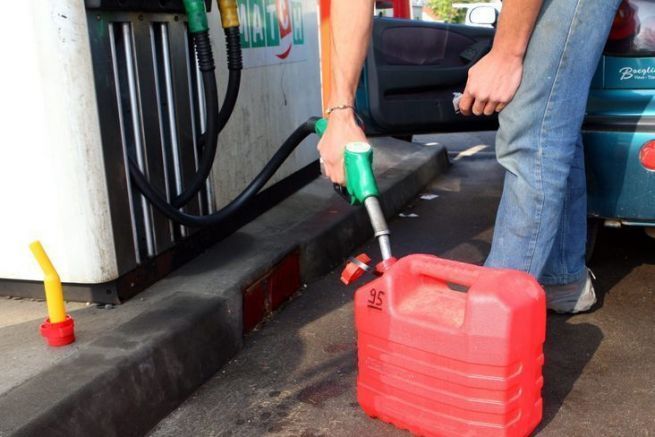
It all comes down to how many hours of runtime can you get out of your generator when it’s powered by a gallon of fuel – this is your starting point in determining gas consumption. You don’t want to spend half of your time refilling the generator, so make sure you realize how much run time you can get out of your generator before going off the grid.
The good news is there are a lot of reliable fuel consumption calculators available online – these can help you get an estimated number quite easily. But before you turn to an online calculator, read the product information provided by the manufacturer. You will find more accurate numbers when it comes to fuel consumption since manufacturers have charts that include all the variables needed for a more precise estimation.
To make sure you’ll have enough fuel for your weekend away and unplugged, imagine the worst-case scenario, a situation where you’ll need to have the generator running continuously for 24 hours at full capacity and plan accordingly.
What to Consider When Buying a Generator for a Travel Trailer
There are a couple of things to consider when looking for generators. Will you be mainly “dry” camping, being completely off-grid? Or will you be “glamping” and parking at an RV park for all of your travels?
If you plan on doing most of your camping without being hooked up to electricity and water, “dry camping,” you need to make sure that you get a generator that is powerful enough to run everything that you want to run.
If you are mainly “glamping,” setting up in an RV park, you will probably only need a small generator for those just-in-case instances. So let’s break it down for you a little bit more.
What are the Best Brands of Portable Generators? Our Top 5 Picks
Now that you have decided if you want a gas or propane-powered generator let’s talk about the best brands of portable generators for your travel trailer.
No matter which brand you choose, make sure you get a generator with a remote start feature. You will be glad you did when you don’t have to run outside first thing on a chilly morning to fire up the generator to start the coffee maker!
1. Westinghouse
There are so many to choose from, but in my research, I have found that the Westinghouse iGen4500 is the one that I like the best.
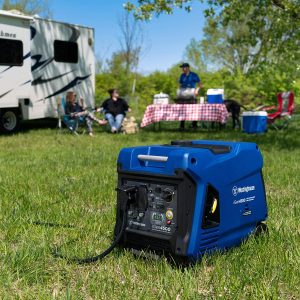 4,500 Peak Watts, 3,700 Running Watts
4,500 Peak Watts, 3,700 Running Watts- RV and Camper Ready with 120V 30A Outlet (TT-30R)
- LED Display – Remaining Run Time, Output, Fuel Level, Volts, Lifetime Hours
- Fuel efficient – Up to 18 Hour Run Time (3.4 gals)
- Remote Start and Push Button Start
- Mounted Wheels and Telescoping Handle
- Super Quiet – Less Noise than Normal Conversation Volume
- Safe for Electronics – Inverter Technology
- EPA and CARB Compliant
2. Ryobi
If you are looking for a smaller generator, I would suggest the Ryobi RYI2300BTA – 2,300-watt Bluetooth generator.
- 2,300 Starting Watts
- 1,800 Running Watts
- Super Quiet Operation
- Downloadable App that allows you to see the fuel level and how much run time is left on the generator right on your smartphone
- An onboard LCD display that shows fuel level, remaining runtime, and the load level
- Ultra-portable with dual rear wheels and a telescoping handle to pull with ease
- 2 – 120-volt outlets and 2 USB ports
RELATED READING: These articles are all about generators for travel trailers.
3. Generac
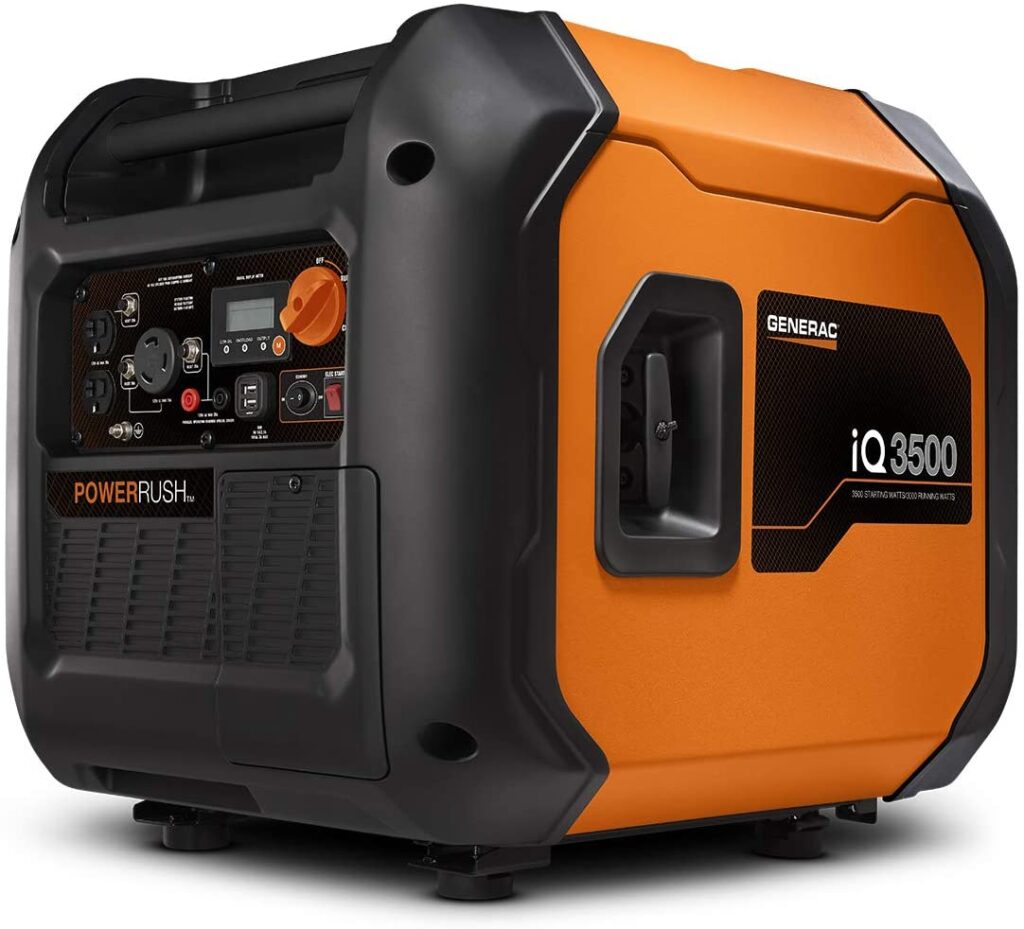
Generac is a popular brand among RVers who enjoy its high-power, quieter design. We’ve heard fantastic things about the Generac 7127 iQ3500.
- 3,500 Starting Watts
- 3,000 Running Watts
- Ultra-quiet–about 40% quieter than Honda Advanced technology
- Rated AC frequency of 60HZ and 16% more power than Honda
- Digital LCD display that shows digital wattage meter, fuel level, remaining runtime, and status
- Ultra-portable with dual rear wheels and a telescoping handle to pull with ease
- 2 – 120-volt outlets, 2 USB ports, and 1 – 120V 30A Twist Lock
4. DuroMax
You’ll also frequently come across the name DuroMax in RV generators, and it’s a brand that comes highly recommended as well. You’ll often find DuroMax generators with very high wattages. If you need a high-power generator, we recommend the DuroMax XP12000EH.
- 12,000 starting watts
- 9,500 running watts
- Dual fuel technology–you can run it on propane or gasoline
- Automatic shut-off when oil gets too low
- Operate at 120V and 240V simultaneously if wanted
- 4-stroke engine with key switch start
- 50 amp and 30 amp outlets, 2 – 120V outlets, 1- 120V 30A twist lock
- Doubles as a home-backup generator
5. WEN
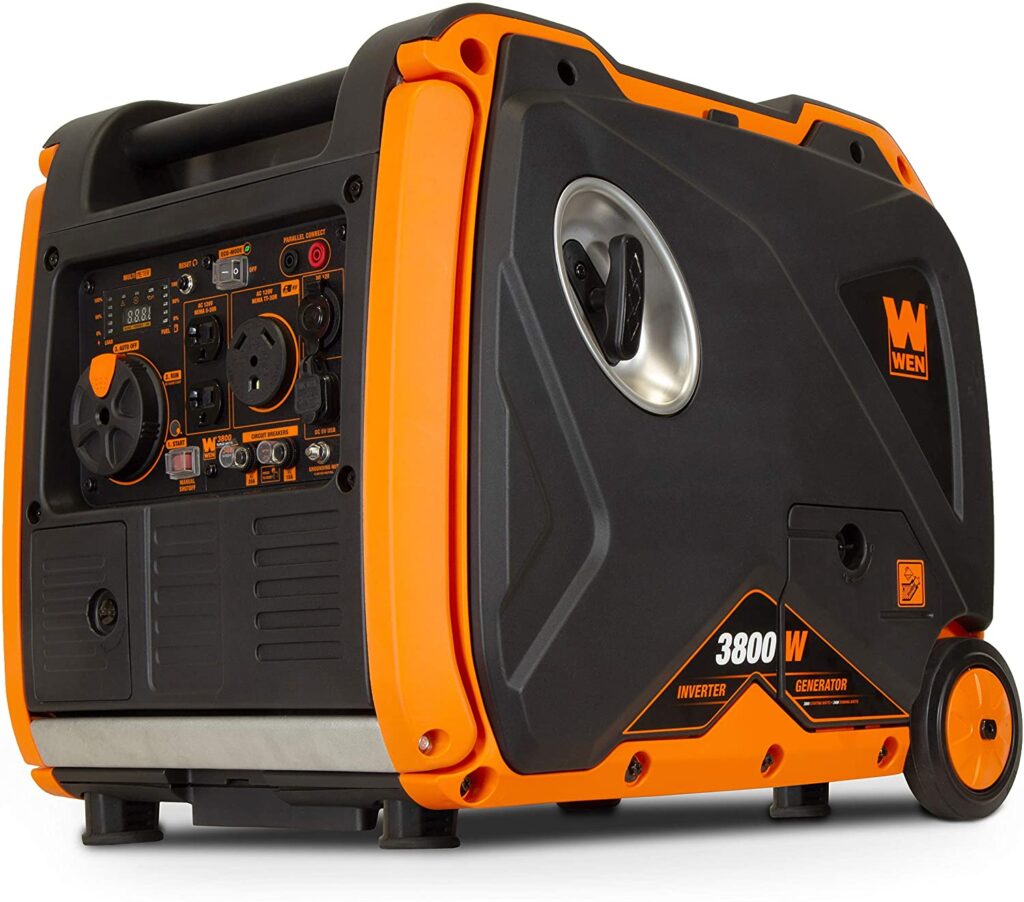
WEN has another great option for moderate power needs in your travel trailer. The WEN 56380i is an RV-ready portable inverter generator that could be perfect for your needs.
- 3,800 starting watts
- 3,400 running watts
- Super quiet operation at only 57 decibels
- Eco-mode switch to run time and maximize fuel economy
- Half-load run time of 8.5 hours
- Features electric start with a fuel shutoff that prevents blockages
- Produces clean power
- 2 – 15A outlets, 12V DC outlet, 30A outlet, and USB port
3 FAQs About Generators For Your Travel Trailer
1. How Much Does A Portable Generator Cost?
When it comes to portable generators, the prices can vary immensely! The Ryobi that is listed above ranges from $550 to $620 depending on when are where you buy it. The Westinghouse iGen4500 is $950 to $1400, again depending on when are where you buy it from.
When it comes to generators, you get what you pay for. If you are looking to save a few bucks and go with a lesser model, the components on the inside may not last as long as a more expensive one. Not to mention, the less expensive ones will not be as quiet as the others either.
2. What’s the Difference Between a Generator’s Starting and Running Watts?
When a generator starts up, it needs some extra power for a few seconds to get the motor running. Starting watts refers to that extra power. After the motor gets going, the power draw will drop down to the running watts, which are the power required to keep an electrical device going.
For example, a 15,000 BTU air conditioner requires around 3,500 starting watts and around 2,000-2,500 running watts to keep going.
Knowing the starting and running watts is important because if you don’t have enough starting watts, and you flip on your AC, it will overload the generator and short your circuit breaker.
3. Do I Really Need a Generator for My Travel Trailer?
I can imagine some of you camping enthusiasts out there shaking your heads at the mention of generators. While I would generally agree with you, wouldn’t you rather be safe than sorry?
Yes, camping should be about reconnecting with nature and leaving behind the world of electricity-powered devices for a couple of days. However, there are some undeniable benefits of having at least a small generator when you’re out in the woods for more than a day or two:
- Keeping your phone charged for safety reasons.
- Lighting up the campsite in the evening.
- Enjoying some music while playing games, eating dinner, or just for some background noise while you are sitting around chatting with your friends and family.
- Cooling your travel trailer on those warm summer nights
How Often Should You Service A Generator?
You should service your generator every 500 hours of operation. Some recommend 6 to 12 months, but it really just depends on how often you are using it. If you are living the RV life, constantly on the road, you’ll hit that 500-hour mark constantly. After all, that’s only a little over 20 days of use.
This is especially true if you are boondocking a lot, or living off-grid, both of which necessitate generator usage far more than camping in campgrounds where shore power is available. When it comes to the spark plugs, however, you should change those out every 100 hours of use, but no longer than 150 hours.
What Size Generator Will You Buy for Your Travel Trailer?
With all that I’ve shared with you, I’m sure you’re well aware there are a lot of factors that come into play when determining what size generator you want to get for your travel trailer, what brand you should get, what kind of fuel you want to use, and how much the generator and fuel will cost you.
We would love to get some feedback from our readers, so please leave your thoughts or suggestions in the comments section below.
Related Reading:
–What Size Generator Is Best For A 30 Amp RV?
–Best RV Backup Power Source: CarGenerator
–How Often Should I Service My RV Generator?
–10 Best Portable And Quiet Generators For Camping
To see a list of all of our articles check out the Blog Archive!
Mike Scarpignato – Bio
Mike Scarpignato created RVBlogger.com over five years ago in 2018 to share all we have learned about RV camping.
Mike is an avid outdoorsman with decades of experience tent camping and traveling in his 2008 Gulf Stream Conquest Class C RV and 2021 Thor Challenger Class A motorhome.
We attend RV Shows and visit RV dealerships all across the country to tour and review drivable motorhomes and towable trailers to provide the best evaluations of these RVs in our blog articles and YouTube videos.
We are 3/4-time RVers who created RVBlogger.com to provide helpful information about all kinds of RVs and related products, gear, camping memberships, tips, hacks and advice.


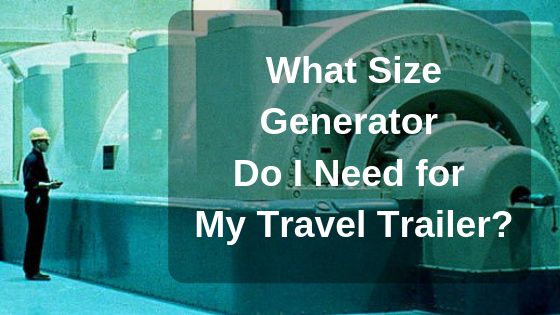
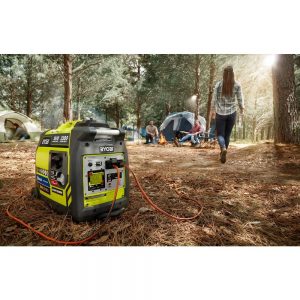
This is an informative and helpful article for anyone considering purchasing or using a travel trailer. It provides valuable information on the size generator needed to power such a trailer, which can be useful when planning trips or choosing the right equipment for your needs.
I would recommend a generator that is at least 2000 watts.
Good information! To expand on your reason to get a generator to cool off on warm summer nights—we’ve had some crazy hot temperatures and smoke-filled air on the west coast. I think it’s almost essential to have a generator for anyone who is sensitive to heat or has asthma.
The Westinghouse iGen4500 you recommend is being returned, worst generator I’ve ever owned. It was great for one day then went haywire. Once the return is complete i’ll buy a generator that works from a company that stands behind its products.
Want to know why you see many fairly new generators for sale at garage sales or Marketplace adds? It’s because nobody takes into consideration that you absolutely need to know the amperage losses due to elevation it will be operated at. You lose @4% output for every 1000 ft. above sea level, so what does this mean when you have a 3600 watt running unit? It means you cannot run your air conditioner and your microwave at the same time when you are at 4600 ft. elevation. In order to due so, you need a bigger unit that will be much heavier and much noisier. If you can afford something in the $5,000.00 range, then you most likely have a $85,000.00 5th wheel or $120,000.00 motorhome and money is not a problem. But for the average person, that’s not the case. So be aware of this issue, unless you live at sea level then this may not be an issue.
Great article. Very clearly laid out. Love the pros and cons. My wife and I are newbies and discovered the value of a generator our third night out unexpectedly in a parking lot for three days. Won’t leave home without one again. What do you know about solar generators?